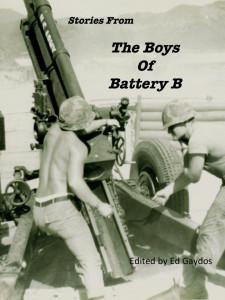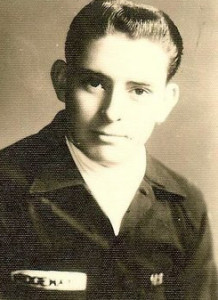Willie J. Ridgeway – Battery Commander – Part One

Cover 3
Joe Mullins on left, Newhouse on right
Picture courtesy Joe Mullins
WILLIE J. RIDGEWAY
Battery Commander
Part One
First Lieutenant Ridgeway, two months after his arrival in Vietnam in September of 1967, served as the Executive Officer of B Battery, second in command under Captain George Moses. He proved to be bright and hardworking; and at 27 years of age was an unusually mature lieutenant. These qualities soon earned him a nomination to interview for a position on the staff of General Blanchard, which did not materialize, but did take him to several assignments at battalion headquarters. Ridgeway was promoted to captain and returned to B Battery to succeed Captain Moses as battery commander when it moved to LZ Sherry in May of 1968. Those early months at Sherry were tense but relatively calm as the battery built up its position. Ridgeway earned the reputation as “a good guy and a good battery commander.
Even tempered men like Captain Ridgeway, who do their jobs with little fanfare and even less drama, leave behind few stories and are simply remembered as one of the good ones. It is the curse of quiet competence.
If that were all there was to Willie J. Ridgeway this would be the end of the story. However there is a great deal more to this man. Here is … in the tradition of Paul Harvey … the rest of the story.
The Young Willie
Willie was 16 years old when he enlisted in the Army, so young his parents had to give their permission. He was an enlisted man for nine years before going to Officer Candidate School. During that time he did tours in Korea and Germany as a supply specialist and eventually worked his way to staff sergeant.
Following an early tour in Korea, Willie returned to Ft. Campbell, Kentucky where he fell into a close friendship with Willard Long. Willard has vivid memories of their time together.
I had a real good friend in Willie Ridgeway. When I first met Willie he was a Spec 4 and he had just come back from Korea. We were 18/19 years old. We was together about ten months.

Early photo of Willie
We were attached to the 101st Airborne Division and Westmoreland was our post commander. He worked in supply in the 21st ordnance company at Ft. Campbell. I was in small arms so I did a lot with supply, and that’s how we met.
I was kind of a standoffish type person. I didn’t quickly make friends with no one. Me and him just kind of hit it off. After you find out that he’s clean living and be around him for a couple weeks, we just kind of migrated together. He was an exceptional person in that he was clean living and he was nice to everyone. I never saw him smoke a cigarette, drink a beer or say a cuss word. He carried a camera with him just about everywhere he went.
When he come out of Korea he bought him a brand new red ‘60 model Ford one weekend back home in Mobile and drove it to Ft. Campbell. Me and Willie had a lot of fun together. We went a lot of places – Nashville to the Grand Ol’ Opry and we went to Kentucky Lake a lot about 30 miles from Ft. Campbell. We would go there on weekends and swim and chase the girls. When you went off with him you never did have to worry about alcohol and he was always a gentleman.
He would go home, back and forth to Mobile a lot. On one trip he picked up a paratrooper in Alabama right outside of Mobile. The man had on his uniform of the 101st and he had a cast on his foot. Willie knew where he was going and could take him right to his door, right to his barracks. But the man had done figured out he was going to steal Willie’s camera and didn’t want Willie to take him to his barracks. Willie didn’t think anything about it and let him out somewheres on post.
At the time I was doing inspections on the 101st rifles. Our ordnance team was going through the whole 101st airborne division. Two days after Willie’s camera got stolen I got to talking to someone and asked him if a man from Mobile with a cast on his foot was in their unit. He said, “Yeah.”
I said, “Just check to see if he signed out on liberty this weekend, when he signed out, and when he signed back in.” I told him I got a good friend that could have possibly picked him up and this guy stole his camera.
The guy had signed out, so they got him and opened his wall locker and there was Willie’s camera. Out of 120,000 paratroopers on that post the Lord led me right to Willie’s camera.
We went back over to their morning formation the next day and that man had to give Willie his camera back in front of his whole company. They called him out of formation. The First Sergeant had the camera and he give it to the soldier that stole it. Willie walked up in his military way, cut his corners, went right up there and the boy handed him his camera back. Willie about-faced and was out of there.
Willie loved the Army. I never could understand it, why he loved the Army so much. He went in so young he had to get his parents permission, and I did too. I went in at 17. I went into the Army to get a pair of shoes and something to eat. It was a good opportunity. It changed me tremendously. I went to bed at 17 and got up in the morning at 25. It gave me a second chance at education.
Willie always wanted to fly. He went a whole winter and he got him a book somewheres on helicopters. He just laid in his bunk and studied all winter on how to fly a helicopter. His ETS (estimated termination of service) was coming up, but he knew he was going to re-enlist and he wanted to go to Ft. Rucker Alabama and go to helicopter school.
B Battery Commander
Willie would eventually make it to helicopter school, but not for another 11 years. After seven years as an enlisted man he went to Officer Candidate School at Ft. Sill Oklahoma. Two years later he went to Vietnam as an artillery 1st lieutenant, serving in succession as Executive Officer of B Battery, battalion staff officer, and then B Battery commander when it moved to LZ Sherry in May of 1968.
Captain George Moses remembers a green but bright 1st lieutenant.
When Lieutenant Ridgeway came out to B Battery as my XO I commented in a letter home that he didn’t know much about 105 mm howitzers. But he was a quick study and became an extraordinarily capable XO. He had to be for us to perform as we did in the Christmas action supporting the 173rd Infantry near Dong Tre, the largest of my tour in Vietnam, the tricky shooting mission at Qui Nhon Bay, our march down to Phan Thiet and defense of that location during Tet of ’68. We were up and down the coast during that period, often splitting the battery into multiple operations.
Ridgeway was nominated to be aid decamp to General Blanchard at First Field Forces, and I encouraged him to consider the job. He remained with us, but I remember him being gone from the battery on battalion business and even taking an assignment there before replacing me as battery commander. He came back to the battery as a captain, promoted well before the usual timetable for captain.
One soldier remembers Ridgeway as a by-the-book officer, who loved to take pictures and carried his camera everywhere.
I remember when LZ Betty got hit one night all we could do was watch the orange and red flames shoot up in the night sky. He was out taking pictures of LZ Betty blowing up. He had a more sophisticated camera than mine and I said, “Are you going to get anything on that.”
He said, “Oh, yeah. I’ve got capability to capture this on film.”
I remember a B-52 strike taking place up the hill from us. He knew they were coming and told us about it. We were out there waiting, and all of a sudden it looked like a power company right-of-way being mowed up the side of the hill. It was amazing. I did not have my camera but Ridgeway got it all I think.
Another, James Gacek, says,
I served with Captain Ridgeway at LZ Judy, and when we moved east to LZ Sherry. I was in charge of FDC (Fire Direction Control – controlled radio communications, travel in and out of the battery and fire missions). I can offer that Captain Ridgeway had a sense of humor and played a mean game of Pinochle. It’s the little things I remember… his gregarious smile … his love for photography … our conversations about the war and what we would do after.
Four things stand out in my memory.
I made the mistake of leaving my dog tags in Qui Nhon. The captain one day gave an order that everybody had to “present dog tags at the evening meal or you wouldn’t eat.” I had been drinking beer all day and from my hooch yelled across to the mess tent that I guess I was going starve. When he heard that he said, ”Sounds like he’s drunk. Go get him and make sure he gets something to eat.”
The battery was split with half the guns at Sherry and half on a mobile operation just west of our base camp at Phan Thiet. My R&R was coming up, just three days away, hence I was chomping at the bit to get to get out to Phan Thiet where I’d catch a plane to Cam Ranh Airbase and then on to Hong Kong. Since my FDC unit had all the communications I knew I couldn’t get a chopper out of Sherry. After much cajoling Captain Ridgeway agreed to allow me take his jeep to Phan Thiet, but only if I took a load of food for our mobile operation near there.
Before this he had afforded me a real privilege. He had expedited my promotion to Specialist 4 (equal in pay grade to a corporal) at the earliest eligibility, and coinciding with my going on R&R.
Then there was the ultimate privilege. When I was due to leave Sherry for home he allowed me to call my own chopper to pick me up, along with Chuck Burly, to fly us to Phan Rang, the first leg of the trip back to the States.
Captain Ridgeway was a fine officer … and man.



